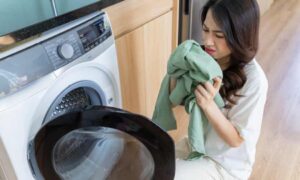
For years, laundry detergents have focused their cleaning power on stain removal and getting whites white but now a new invisible enemy has emerged in the shape of the musty smell that clings to your gym gear.
The shift to remote working has fuelled the popularity of “athleisure” clothing such as T-shirts, joggers and leggings which, rather than shirts and dresses, are now the default work wardrobe of many Britons.
But less commuting means 70% of the clothing we stick in the drum have no visible stains, according to new research. Instead it is impregnated with invisible sweat, dust and smell-causing body oils, with the issue acute for “malodour-retaining” athleisure wear.
Eduardo Campanella, the business group president at Unilever Home Care, which owns household names including Persil and Comfort, explains the source of the problem: “Athleisure wear is made from synthetic fibres which have been specifically constructed with a capillary action to wick away wetness from the body.”
“In addition to this, synthetic fibres are more hydrophobic [oil-loving] which naturally hold on to body oil and body excretion. As a result, athleisure wear is more prone to malodour.”
But because the clothes at least look clean and energy – and in some cases water – bills are so high, Britons want to get rid of any lingering smells but also want to use shorter wash cycles that are better for the environment.
In response, Unilever has launched the Persil spin-off Wonder Wash which it says does the job in 15 minutes.
With some hyperbole Unilever boasts that this new “15-minute laundry detergent”, with its 35 patents pending, will “create a new category of laundry products”.
It comes at a time when, under pressure to improve their environmental credentials by removing harsh chemicals and working at lower temperatures, traditional washing powders and liquid-makers face competition from new eco products such as plastic-free washing “sheets” that are becoming a more common sight.
The new cleaning elixir contains a blend of fast-acting ingredients, said Campanella, who in layperson’s terms explained the technology “binds to malodour molecules ensuring they don’t stick, as well as pulling the malodour molecules out”.
While the company’s scientists used cutting-edge robotics and AI to come up with the formula for the smell-busting detergent, which sells for about £7 a bottle, there are DIY remedies. Store cupboard ingredients such as bicarbonate of soda and white vinegar are among the popular, cleaning hacks suggested.
Lynsey Crombie, the TV cleaning expert and influencer known as the “Queen of Clean” uses the tried-and-tested method of pre-soaking gym kit in cold water and white vinegar before washing.
